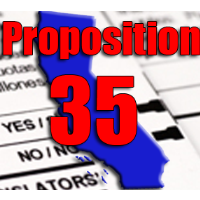Judge Blocks Human Trafficking Proposition

A federal judge, responding to a complaint that Proposition 35 is unconstitutionally overbroad, put the human trafficking initiative temporarily on hold.
U.S. District Judge Thelton Henderson set a November 20 court date for the class action filed by the ACLU and the Electronic Frontier Foundation (EFF) on behalf of California Reform Sex Offender Laws and two anonymous men.
Although the initiative’s main focus is on trying to curb human trafficking, it also requires registered sex offenders to give police a list of their user names, screen names, email addresses and Internet service providers.
The plaintiffs say the requirements, which violate fundamental rights by reaching beyond persons reasonably expected to be a threat, should not be imposed on registered sex offenders who do not pose a high of risk using the internet to commit new crimes. EFF attorney Hanni Fakhoury said in a statement: "Requiring people to give up their right to speak freely and anonymously about civic matters is unconstitutional.”
Under the law, registered sex offenders must inform law enforcement officials within 24 hours of setting up a new online account or screen name. More than 73,000 people on the state’s sex registry would be affected by the law, according to the complaint. The penalty for violation is up to three years in prison.
Some critics maintained that the law would have an impact on sex-related crimes, like prostitution, in a way not directly addressed in the proposition. Naomi Akers, executive director of St. James Infirmary in San Francisco, wrote on Facebook that she feared she would be subject to the law because, in an earlier incarnation, the woman who now heads up a medical clinic for current and former sex workers worked as a prostitute and was convicted of lewd conduct.
Posting before the law passed, she wrote: “If Prop. 35 passes, I will be required to register as a sex offender for the rest of my life and have my Internet monitored for LIFE!”
Chris Kelly, former Facebook chief privacy officer and proposition sponsor, called the lawsuit “fanciful and dangerous.” He said, “The ACLU and EFF challenge to Proposition 35 is an attack on the very idea of sex offender registration requirements. . . . The ACLU's claims have been previously litigated many times, and courts have repeatedly rejected their fanciful and dangerous misinterpretations of the Constitution.”
–Ken Broder
To Learn More:
Judge Temporarily Blocks Proposition 35, Sex Trafficking Law (by Coburn Palmer, SF Weekly)
Sex Offenders Win Stay of Prop. 35 (by Maria Dinzeo, Courthouse News Service)
Statement from Prop 35 Campaign Regarding ACLU Lawsuit following Landmark Victory on Election Day 2012 (San Francisco Chronicle)
Critics Raise Specter of Police State in Challenge to New Calif. Law (by Declan McCullagh, CNET)
- Top Stories
- Controversies
- Where is the Money Going?
- California and the Nation
- Appointments and Resignations
- Unusual News
- Latest News
- California Forbids U.S. Immigration Agents from Pretending to be Police
- California Lawmakers Urged to Strip “Self-Dealing” Tax Board of Its Duties
- Big Oil’s Grip on California
- Santa Cruz Police See Homeland Security Betrayal in Use of Gang Roundup as Cover for Immigration Raid
- Oil Companies Face Deadline to Stop Polluting California Groundwater





